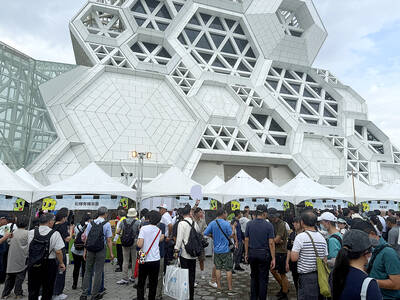Young, pretty and hoping for stardom, Saki Kozai thought she had found her ticket to fame after an apparent model scout spotted her on a Tokyo street and offered her a job.
Then just 24 years old, starstruck and excited, she quickly signed a deal with the agency he introduced her to, believing that she would soon star in promotion videos. In fact, it was not a modeling agency, and on her first day Kozai discovered the job required her to have sex on camera.
“I couldn’t take off my clothes. All I could do was cry,” she told AFP, adding that she saw no way out of her dire situation.

Photos: AFP
“There were about 20 people around me, waiting. No woman could say ‘no’ when they’re surrounded like that,” she said.
Kozai, now 30, is among a growing number women who are stepping out of the shadows to say they were forced to work in Japan’s multi-billion-dollar porn industry.
Adult films are widely available in Japan, which has a relatively liberal attitude toward pornography.
But the industry’s dark side is rarely discussed, nor are the rights of those who work in it. Accusations that women were made to perform in sometimes brutal sex scenes, on film against their will, prompted the industry to issue an unprecedented apology and promise change.
The surprise mea culpa followed the June arrest of three Tokyo talent agents accused of forcing a woman to appear in more than 100 pornographic videos. Like Kozai, the unnamed woman also thought she would be modeling.
Critics say porn recruiters trick young women — including minors — with promises of showbusiness stardom. In other cases, girls have been lured by a lavish lifestyle before they are put to work in sex films to pay off the “debt.”
Agencies keep them stuck with threats, intimidation and fraudulent contracts.
‘NO CHOICE’
Another woman AFP interviewed, who declined to be named, said she was tricked into porn by an agent who promised to help her become a singer.
She signed a contract that she says did not make clear the nature of her real work.
“The agency spent months trying to convince me. I had no choice” after signing the contract, the 26-year-old told AFP.
She resisted at first. But like Kozai and others, she succumbed to the pressure.
“At first, I said I couldn’t do it,” she added. “But when I did, it really hurt. The production team wouldn’t stop though.”
Japanese non-profit group Lighthouse, which works to stop human trafficking, said more than 60 actresses trying to escape the business contacted them in the first half of this year — well above previous years.
“And we think this is just the tip of the iceberg,” said Lighthouse spokeswoman Aiki Segawa. “Many victims feel guilty, thinking that what happened is their fault.”
Most women are young — between 18 and 25 — with little knowledge of legal contracts and a tough case to prove in court.
“They’re not necessarily all abused or locked up...It’s more like they are tricked into it,” Segawa said.
Kozai got hooked on tranquilizers to deal with the anxiety said she was isolated after the agency convinced her to cut off contact with family to focus on her career.
“I couldn’t make rational decisions anymore,” she said.
Kozai eventually left the agency that she says brainwashed her. But she continues to act in adult films as a freelancer.
A report by Tokyo-based Human Rights Now details a list of dirty tricks used by porn recruiters.
Among them, victims are sometimes threatened with exorbitant fines to get out of vaguely worded contracts or told they would never be able to find a job outside porn after appearing on film.
Scouts have also shown up at university campuses or a victim’s home to demand huge fines from their parents if they refused to work, it said.
DEPRESSION, SUICIDE
Last year, the Tokyo District Court threw out an agency’s bid to extract a 24 million yen (US$240,000) penalty from a women who refused to appear in porn films — a rare legal victory, critics say.
Japan releases some 30,000 adult films annually, according to industry figures.
And it can be nearly impossible to get coerced pornography out of distribution in the Internet age.
One woman cited in the report had repeated plastic surgeries to escape her past, while another told an NGO she planned to hire a lawyer to stop the distribution of movies she appeared in. But she hanged herself before proceeding with the case, the report said.
Mariko Kawana, a pornstar-turned-novelist, started an organization this summer calling on the industry for uniform, transparent contracts.
“Every adult movie company has its own rules — it should be unified to protect the rights of actresses,” said Kawana, who says she worked in the business by choice.
For Kozai, who is mulling legal action against her former agency, the arrests and heavy media coverage may be the tipping point for change — and help other women avoid her fate.
“If I can become an example, other girls who face these kinds of problems might be saved,” she said.

Following the shock complete failure of all the recall votes against Chinese Nationalist Party (KMT) lawmakers on July 26, pan-blue supporters and the Chinese Communist Party (CCP) were giddy with victory. A notable exception was KMT Chairman Eric Chu (朱立倫), who knew better. At a press conference on July 29, he bowed deeply in gratitude to the voters and said the recalls were “not about which party won or lost, but were a great victory for the Taiwanese voters.” The entire recall process was a disaster for both the KMT and the Democratic Progressive Party (DPP). The only bright spot for

Water management is one of the most powerful forces shaping modern Taiwan’s landscapes and politics. Many of Taiwan’s township and county boundaries are defined by watersheds. The current course of the mighty Jhuoshuei River (濁水溪) was largely established by Japanese embankment building during the 1918-1923 period. Taoyuan is dotted with ponds constructed by settlers from China during the Qing period. Countless local civic actions have been driven by opposition to water projects. Last week something like 2,600mm of rain fell on southern Taiwan in seven days, peaking at over 2,800mm in Duona (多納) in Kaohsiung’s Maolin District (茂林), according to

Aug. 11 to Aug. 17 Those who never heard of architect Hsiu Tse-lan (修澤蘭) must have seen her work — on the reverse of the NT$100 bill is the Yangmingshan Zhongshan Hall (陽明山中山樓). Then-president Chiang Kai-shek (蔣介石) reportedly hand-picked her for the job and gave her just 13 months to complete it in time for the centennial of Republic of China founder Sun Yat-sen’s birth on Nov. 12, 1966. Another landmark project is Garden City (花園新城) in New Taipei City’s Sindian District (新店) — Taiwan’s first mountainside planned community, which Hsiu initiated in 1968. She was involved in every stage, from selecting

The latest edition of the Japan-Taiwan Fruit Festival took place in Kaohsiung on July 26 and 27. During the weekend, the dockside in front of the iconic Music Center was full of food stalls, and a stage welcomed performers. After the French-themed festival earlier in the summer, this is another example of Kaohsiung’s efforts to make the city more international. The event was originally initiated by the Japan-Taiwan Exchange Association in 2022. The goal was “to commemorate [the association’s] 50th anniversary and further strengthen the longstanding friendship between Japan and Taiwan,” says Kaohsiung Director-General of International Affairs Chang Yen-ching (張硯卿). “The first two editions